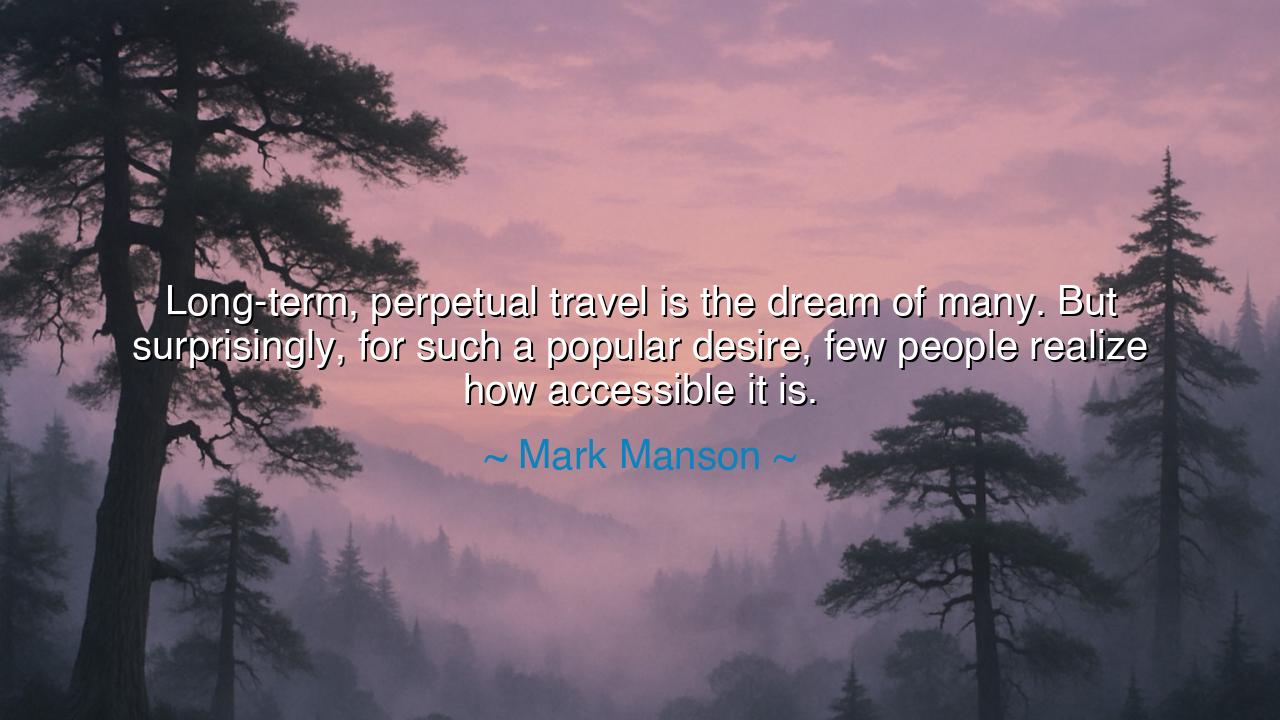
Long-term, perpetual travel is the dream of many. But
Long-term, perpetual travel is the dream of many. But surprisingly, for such a popular desire, few people realize how accessible it is.






Hear, O wanderers of heart and seekers of freedom, the words of Mark Manson, who declared: “Long-term, perpetual travel is the dream of many. But surprisingly, for such a popular desire, few people realize how accessible it is.” These words ring with both wonder and rebuke, for they reveal the great contradiction of mankind: to yearn for distant horizons while shackled by illusions of impossibility.
To dream of endless journeys is to awaken the ancient longing of the human spirit. Since the dawn of time, men and women have looked to the mountains and seas and whispered, “What lies beyond?” This desire is not mere leisure, but the call of discovery, of freedom from the chains of routine, of immersion into the great story of the world. Yet Manson’s insight is piercing: though multitudes harbor this fire, few recognize that the gates are not as tightly barred as they imagine. The path to long-term travel is often hidden only by fear and habit.
For the truth is this: what many believe to require vast fortunes or heroic privilege is in fact within reach of those willing to live differently. To wander without ceasing does not demand palaces or luxury; it demands only the courage to sacrifice comfort, to exchange possessions for experiences, to choose the road over the couch, and the unknown over the safe. The barrier is not wealth, but will. The chains are not iron, but the illusion that it cannot be done.
Consider, O listener, the tale of Ibn Battuta, who, centuries ago, left his home in Morocco and wandered for nearly thirty years, reaching the far corners of Asia, Africa, and beyond. He was no emperor, no conqueror, but a simple man whose hunger for exploration outweighed his need for permanence. His journeys remind us that perpetual travel has never been reserved for kings. It belongs to those who surrender to the road, who choose motion over rest, and wonder over certainty.
The meaning of Manson’s words is therefore both empowering and unsettling: the dream many hold in secret is not a fantasy, but a possibility. Yet it requires honesty, for one must admit that the reason it is not pursued is not because it cannot be done, but because one has chosen differently. The shackles of career, possessions, and fear are self-forged, and can be unlocked by those bold enough to live beyond them.
The lesson, O child of tomorrow, is this: if the dream of travel burns within you, do not dismiss it as unattainable. Question the limits you assume. Ask yourself what is truly required—often less than you believe. Many who wander the earth today do so not with riches, but with simplicity, discipline, and courage. If you desire it, shape your life toward it, for the road is waiting.
Practical action follows: shed the excess that ties you down—possessions, debts, excuses. Save not for grandeur, but for freedom. Learn to live with less, and you will gain the ability to live with more—more horizons, more stories, more wonder. Make a plan not for someday, but for soon. For the world is vast, and your days are finite; do not let the dream die as an untrodden path.
Therefore, remember Manson’s wisdom: the dream of long-term, perpetual travel is not for the chosen few, but for any who dare to claim it. The gate is open, though many imagine it closed. Walk through it, and you will discover that the road does not simply take you to new lands—it remakes you, enlarges you, and teaches you that freedom was always nearer than you believed.






AAdministratorAdministrator
Welcome, honored guests. Please leave a comment, we will respond soon